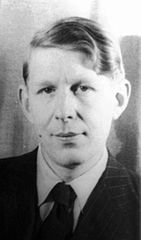All I have is a voice
To undo the folded lie...
There is no such thing as the State
And no one exists alone;
Hunger allows no choice
To the citizen or the police;
We must love one another or die.
These evocative lines are from "Sept. 1, 1939," a poem by W.H. Auden, written toward the outbreak of World War II. It concerns, among other things, our inability to act on terrible events far away, or the belief that we're ignorant of calamity, as well as the importance of personal action and accountability.
It's well worth reading, especially today as world events continue to swirl around us far away -- Ukraine, Syria, Uganda and Central Africa. (You can find the poem online here.)
What's interesting about Auden, though, is how much he did without calling attention to it. He was one of the most famous poets of his age, and often called upon to weigh in on events, which he resisted. He preferred to act anonymously, acting on behalf of others, but never calling attention to himself. How rare is that? Especially for a public figure.
His literary executor Edward Mendelson writes about this in a new essay, "The Secret Life of W.H. Auden," in The New York Review of Books.
As Mendelson writes,
"He was disgusted by his early fame because he saw the mixed motives behind his image of public virtue, the gratification he felt in being idolized and admired. He felt degraded when asked to pronounce on political and moral issues about which, he reminded himself, artists had no special insight. Far from imagining that artists were superior to anyone else, he had seen in himself that artists have their own special temptations toward power and cruelty and their own special skills at masking their impulses from themselves."
What Auden did, as Mendelson has discovered, was to act on behalf of others as quietly as possible: small actions that had great effect. He held a correspondence with a prisoner, giving him a long-distance course in literature. He donated a manuscript to pay for a friend's operation. He used money he'd received for television work to help pay for repairs to a homeless shelter. And he tried his best to remain humble: "When he felt obliged to stand on principle on some literary or moral issue, he did so without calling attention to himself," Mendelson writes.
Not all of us will be famous, but all of us should strive, I believe, to do good things without expecting to be noticed for them. The good is good in itself isn't it? Even if you're famous.
